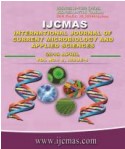


 National Academy of Agricultural Sciences (NAAS)
National Academy of Agricultural Sciences (NAAS)

|
PRINT ISSN : 2319-7692
Online ISSN : 2319-7706 Issues : 12 per year Publisher : Excellent Publishers Email : editorijcmas@gmail.com / submit@ijcmas.com Editor-in-chief: Dr.M.Prakash Index Copernicus ICV 2018: 95.39 NAAS RATING 2020: 5.38 |
This is a prospective study done in 2 tertiary care hospitals and a super-specialty hospital attached to a medical college. 50 patients undergoing cholecystectomy were included in the study. Patients with even a single macroscopic gall-stone anywhere in the biliary tract were included in Category-A and the rest in Category-B. The aim of the project was to find out the difference, if any, in the bacteriological profile and antibiogram of bile in patients in these two categories which cover most of the causes of cholecystitis, and help in better management of these patients especially in places where facilities to drain and culture bile are not available. The bile collected was immediately taken to microbiology department and inoculated into Selenite-F broth and BHI broth and incubated at 37ºC. Cultures were performed on sheep blood agar and MacConkey agar. Bacterial identification was done based on standard biochemical reactions and antibiogram performed as per CLSI guidelines 2014. 68% of Category-A patients had positive culture in contrast to 80% in Category-B. Category-A was dominated by females in their 5th and 6th decade while Category-B had males in their 6th and 7th decade. Klebsiella and E.coli were equally frequent in Category-A patients while the Category-B was dominated by E.coli. Enterococcus was third most common (13.5% of all positive cases). Pseudomonas, Gram negative non fermenters (GNNF) covered the rest. Cholangiocarcinoma was more prone to bacterial invasion than peri-ampullary carcinoma. Only around 8.1% of the cases are associated with poly-microbial infection. There seemed to be some association between biliary stricture and GNNF. Antibiogram was almost similar in the two categories with overall in vitro sensitivity being maximum with Amikacin (81%), followed by Piperacillin-tazobactum (77%), and Gentamicin (64%). Cefepime (13%), Ampicillin (22%), Amoxicillin-Clavulanate (23%), Cefotaxime (27%), Ciprofloxacin (29%) showed poor sensitivity.
 |
 |
 |
 |
 |